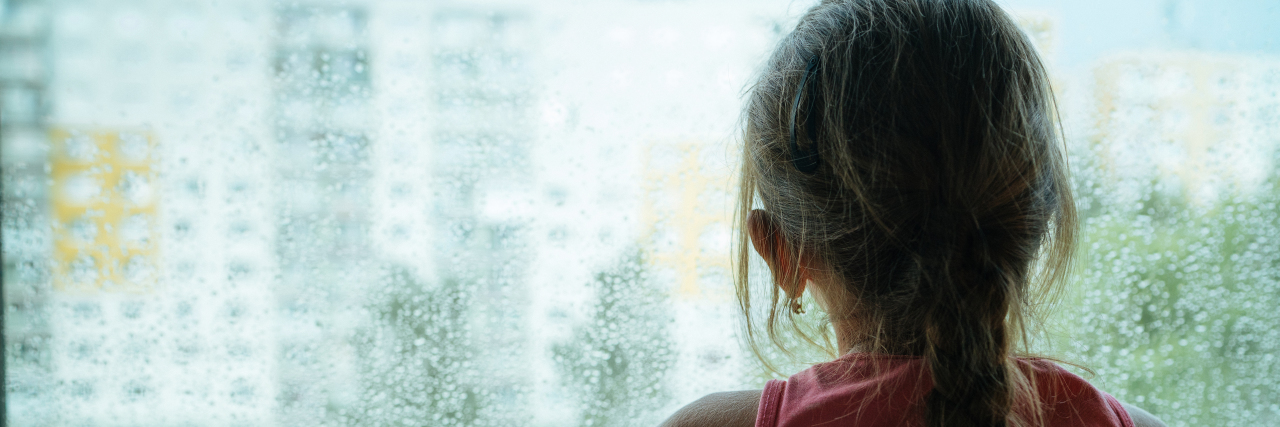What It's Like to Be a Child With Undiagnosed Disabilities
Editor's Note
If you live with an eating disorder, the following post could be potentially triggering. You can contact the Crisis Text Line by texting “NEDA” to 741741.
If you struggle with self-harm or experience suicidal thoughts, the following post could be potentially triggering. You can contact the Crisis Text Line by texting “START” to 741741. For a list of ways to cope with self-harm urges, visit this resource.
I spent my childhood being inside my mind … a lot. This is both a positive thing and a negative thing. My mind oscillated between mental highs in which I felt extremely creative and imaginative (in my own rich inner world), and the lows of moderate to severe undiagnosed anxiety. While my anxiety and undiagnosed OCD often took over my mind hijacking my thoughts, I was “high-functioning” in the respect that I did well in school and didn’t cause any problems at home.
As I said, I was in my head a lot. I would not get a diagnosis of ADHD or a learning disability until age 24. This is because I functioned well on the outside (as a kid who looked as though she had it altogether), despite the frequent tears, low frustration tolerance, challenges with math, and nervousness.
Other relevant stories:
• PMDD and ADHD
• Can You Have ADHD and Depression?
• Do I Have ADHD or Am I Just Lazy?
• What is ADHD?
Stomach aches were a regular thing for me. I also would unintentionally vomit frequently from a combination of overeating and anxious feelings swirling around my body and mind.
I found school to be a challenge, but despite that, I liked it. I worked hard to combat my daily fears, even as compulsions developed in response to my disturbing and upsetting thoughts. I compensated for having a mild auditory processing deficit, along with my challenges with math, and sensory processing/fine motor skills.
I was the kid that no one worried about. I was the kid that seemed as though everything was going right. Perhaps this was because of my strong verbal, reading, and writing skills that were developed from a young age. So even though I struggled with math, disorganization, and daydreaming, no one thought anything of it.
I grew up with sensory issues as well (as I have written about before), in which I couldn’t go barefoot (always had to be wearing socks) and I had an affinity for spending time in water, wether that be a pool, shower, or my hands in the sink.
One thing I want to clarify is that “high-functioning” doesn’t always mean “not that bad.” My struggles, from my own personal perspective, were challenging and scary to live with silently, unknown to anyone other than myself.
As a teenager, I found myself battling depression, mood swings, OCD, trauma, and even the start of an eating disorder. I also began to self-harm. But you know what else? I found myself making valiant efforts towards writing multiple short stories and novels. I also found myself doing well in school and sports, something that probably masked my issues further. I found myself often in despair or emotional pain, however, by writing I was able to get some of this pent up energy and mental hyperactivity out onto paper.
So, in essence, what was it like to be an undiagnosed child and a teenager with mental illness and learning challenges?
It was hard.
It was lonely.
It was scary.
But you know what else?
It helped me grow into a resilient adult.
It helped me to fall into a place of advocacy for others growing up with similar issues.
It likely helped my writing (fiction, nonfiction, and poetry) become that much better, stronger, interesting … and the list goes on.
So, in a way, I am grateful for the challenges that were a part of my otherwise happy childhood. When I think of myself as a kid or a teenager, I often think about my imagination, my colorful inner world. I think about the things I used to create in my mind, and eventually onto paper. I think about how I have fostered my gift to communicate with written words over the years, and how in a way, my undiagnosed issues have inspired much of my writing in the present day.
Overall, I just want to give my 10-year-old self a hug, and to let her know that she isn’t “weird” or “messed up;” she’s just unique in her own way, and that help is on the way. I would say that everything is going to be OK.
And I want to say to YOU (the reader) that if any part of this story resonates with you, you are far from alone. I know my story is not unique — many of us go years undiagnosed with invisible disabilities or mental illness. It’s never too late to receive help.
Photo credit: Train_Arrival/Getty Images

